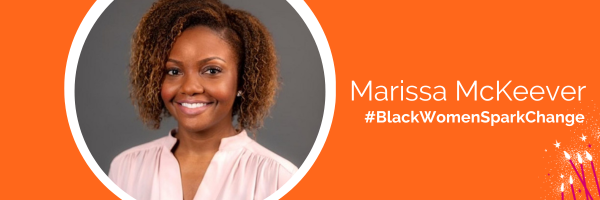
In her role at Sibley Memorial Hospital, Marissa drives healthcare advocacy and community investments
Marissa McKeever has always been passionate about access, particularly among historically marginalized communities. That, she says, is what motivated her to pursue a law career.
“By high school I knew that was my path,” Marissa says. “I wanted to go to law school, become an attorney and focus my work on generating economic mobility within underrepresented minority communities.”
Despite a clear-cut goal, Marissa spent her time at Messiah College and her law school years dabbling in different “lanes of access” — different internships, research and coursework. This, she explains, helped her define her path even more until she found a passion for healthcare.
“During my second summer at Harvard Law School I worked at a firm that was heavily involved in the legislative aspects of the Affordable Care Act,” Marissa says. “That helped me see the big picture. Until then I had been so invested in a number of issues facing Black communities — everything from criminal justice to education to healthcare. There are so many lanes when you think about communities and the lack of access to services and opportunity.”
Changing care and changing her DC community
Understanding the full potential of the Affordable Care Act and what it could do to reduce barriers to care for high-needs populations solidified Marissa’s interest in healthcare even more. That fall, she headed back to Harvard with an eye on shaping policy and initiatives surrounding access to healthcare services.
After graduation, Marissa headed to the DC Office of the State Superintendent of Education (OSSE) where she supported Race to the Top, then practiced health law and also worked as a Senior Legislative Assistant in Washington, DC. Then, in 2015, Marissa headed to Sibley Memorial Hospital, part of Johns Hopkins Medicine, and was named Director, Government and Community Affairs. In this role, Marissa oversees Sibley’s policy agenda and community investments.
“I grew up in Prince George’s County, Maryland” she says, “so to be able to come back and get ingrained in the neighborhoods here and dig into the issues in DC has been incredible. There’s been so much economic development in the greater DC area over the last 10, 15, 20 years. This has created so many unique opportunities for millennials and others to come to DC and be part of our culture and our workforce. But it’s also widened our racial wealth gap and significant economic and health disparities.”
In her role, Marissa says, she’s able to be part of a health system where advocacy, community partnerships and legislative work intersect — and where her organization can make meaningful strides to impact lasting change.
“It’s a personal and professional passion of mine, and it’s been a rewarding experience,” says Marissa. “There are so many different elements involved in healthcare — clinical, regulatory, operations, community. Through our work we’ve been able to extend beyond our hospital walls, to invest in creating healthier neighborhoods.”
Building equity in healthcare and beyond
This year, Marissa says, has been particularly challenging for the extended healthcare community. For too long, she notes, healthcare systems have been built internally, without engaging the community. More than ever, Marissa and her team have pushed to change this and instead, meet people where they are.
“COVID-19 and its impact on everything from care to employment to the overarching economic impact paired with the racial justice movement created an even more significant place to think about how we engage differently with residents and communities who have been intentionally excluded from our systems,” Marissa says. “We now have an opportunity to dig more and listen to diverse communities — for us that means listening to communities, then making shifts in the way we do and have always done things by including marginalized groups as collaborative partners in designing solutions that advance equity.”
Despite Sibley’s successes and positive response from the community, Marissa says they still have a long road ahead of them.
“There are historical roots of racism and racism in healthcare,” she says. “Rewriting policies, repairing harm and building trust and relationships within communities that have been marginalized — it’s going to be a long journey. I’m blessed and honored to be in a role that allows me to create that bridge between healthcare and the DC community.”
